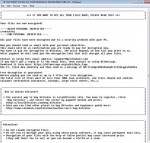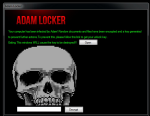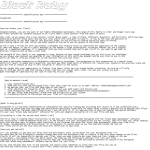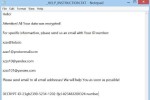Remove .SYSTEM Files Virus
 .SYSTEM Files Virus is ransomware, a file-encrypting type of malicious software. Ransomware for the most part uses spam emails and fake fake to invade, and this one likely used the same ways. File-encrypting malicious software will encrypt your files immediately upon entry and demand money, which is why it's believed to be a highly dangerous threat. If if you regularly backup your data, or if malware researchers release a free decryptor, file-recovery would not be complex. Other than that, it could not be possible to restore your files. Paying for the presented decoder will not necessarily lead to data decryption so keep that in mind if you choose to pay. Crooks already locked your files, what's preventing them from being even more horrible by not decrypting your data after you pay. Since paying could not be the most reliable way, you should just terminate .SYSTEM Files Virus.
Read more...
.SYSTEM Files Virus is ransomware, a file-encrypting type of malicious software. Ransomware for the most part uses spam emails and fake fake to invade, and this one likely used the same ways. File-encrypting malicious software will encrypt your files immediately upon entry and demand money, which is why it's believed to be a highly dangerous threat. If if you regularly backup your data, or if malware researchers release a free decryptor, file-recovery would not be complex. Other than that, it could not be possible to restore your files. Paying for the presented decoder will not necessarily lead to data decryption so keep that in mind if you choose to pay. Crooks already locked your files, what's preventing them from being even more horrible by not decrypting your data after you pay. Since paying could not be the most reliable way, you should just terminate .SYSTEM Files Virus.
Read more...
Remove MBRlock ransomware
 MBRlock ransomware is a will leave your files encoded if it manages to get in. The fact that file-encrypting malware encrypts your files and then demands money is one of the reasons why it's one of the most risky malware out there. Regrettably, oftentimes, users end up not getting their files back. It's pretty easy to get infected, all you have to do is open a malevolent email attachment or fall for a deceiving download. These kinds of things are what specialists are warning users about routinely. When file-encrypting malware strikes, users are demanded to pay a ransom, which shouldn't even be an option, in our view. Cyber criminals could just take your money and not unlock your data. Rather than giving into the demands, you should remove MBRlock ransomware.
Read more...
MBRlock ransomware is a will leave your files encoded if it manages to get in. The fact that file-encrypting malware encrypts your files and then demands money is one of the reasons why it's one of the most risky malware out there. Regrettably, oftentimes, users end up not getting their files back. It's pretty easy to get infected, all you have to do is open a malevolent email attachment or fall for a deceiving download. These kinds of things are what specialists are warning users about routinely. When file-encrypting malware strikes, users are demanded to pay a ransom, which shouldn't even be an option, in our view. Cyber criminals could just take your money and not unlock your data. Rather than giving into the demands, you should remove MBRlock ransomware.
Read more...
Remove Twist ransomware
 Twist ransomware may be the file-encrypting malware to blame for your file encoding. File-encrypting malicious software generally enters systems through spam emails or dangerous downloads, and this one probably used the same ways. File-encoding malware will lock your files immediately upon infection and demand money, which is why we believe it to be one of the most harmful threats out there. If back up is something you regularly do, or if malware researchers release a free decryptor, file-recovery should not be complex. You ought to know, however, that if those two options are not available, data loss would be inevitable. By paying the ransom, you may not necessarily get your files back so bear that in mind if you're considering paying. It's probable that the hackers will just take your money without decrypting your data. Since paying isn't a dependable file recovery choice, you ought to simply uninstall Twist ransomware.
Read more...
Twist ransomware may be the file-encrypting malware to blame for your file encoding. File-encrypting malicious software generally enters systems through spam emails or dangerous downloads, and this one probably used the same ways. File-encoding malware will lock your files immediately upon infection and demand money, which is why we believe it to be one of the most harmful threats out there. If back up is something you regularly do, or if malware researchers release a free decryptor, file-recovery should not be complex. You ought to know, however, that if those two options are not available, data loss would be inevitable. By paying the ransom, you may not necessarily get your files back so bear that in mind if you're considering paying. It's probable that the hackers will just take your money without decrypting your data. Since paying isn't a dependable file recovery choice, you ought to simply uninstall Twist ransomware.
Read more...
Remove AdamLocker ransomware
 AdamLocker ransomware will encrypt your files the moment it infects your operating system because it is aggressive file-encoding software. Ransomware viruses are one of the most damaging infections out there as they encode files and then demand. We should advise you that frequently, users do not restore their files. You could get contaminated by file-encoding malware by not being vigilant when opening email attachments or if you fall for a malicious download. This is why researchers have been alerting users for years that they ought to be very vigilant when using the Internet. When users happen upon malicious file-encrypting software, they are pressed to pay the ransom, which they should certainly not do, in our view. Crooks can just take your money and not decode your files. We encourage you to terminate AdamLocker ransomware, and ignore the demands.
Read more...
AdamLocker ransomware will encrypt your files the moment it infects your operating system because it is aggressive file-encoding software. Ransomware viruses are one of the most damaging infections out there as they encode files and then demand. We should advise you that frequently, users do not restore their files. You could get contaminated by file-encoding malware by not being vigilant when opening email attachments or if you fall for a malicious download. This is why researchers have been alerting users for years that they ought to be very vigilant when using the Internet. When users happen upon malicious file-encrypting software, they are pressed to pay the ransom, which they should certainly not do, in our view. Crooks can just take your money and not decode your files. We encourage you to terminate AdamLocker ransomware, and ignore the demands.
Read more...
Erase Hermes 2.1 ransomware
Hermes 2.1 ransomware will encode your files the minute it enters your device since it is ransomware. Malicious file-encrypting software viruses are extremely harmful computer infections as they that victims pay a ransom. We should warn you that usually, users don't lose their files. You possibly opened a dangerous email attachment or fell for a fake download recently and that is how you your system contaminated. Specialists have been alerting users about the terrible consequences that careless Internet use can cause but file-encoding malware threats are still very commonplace. Upon infection, you are asked to pay for a decoding program but it is uncertain that your data will be recovered this way. It would actually be shocking if you got your files decrypted after payment, as cyber criminals don't feel obligated to aid you. Do not give into the demands, and just delete Hermes 2.1 ransomware. Read more...Remove FriedEx ransomware
 FriedEx ransomware will encode your files the moment it enters your machine since it's file-encrypting malware. Ransomware requests money in exchange for file recovery, which makes it one of the most alarming malevolent program out there. Sadly, frequently, users are left with worthless files. It's very easy to to infect your OS, all you really need to do is open a malevolent email attachment or fall for a bogus download. This is why you ought to follow the input of professionals when they alert you about these things. If ransomware strikes, users are asked to pay a ransom, which they should obviously not do, in our view. It is quite dubious that ransomware creators will feel compelled to decrypt your data even if you pay, so you should reconsider your decision if you have decided to pay. Don't pay mind to the demands, and delete FriedEx ransomware.
Read more...
FriedEx ransomware will encode your files the moment it enters your machine since it's file-encrypting malware. Ransomware requests money in exchange for file recovery, which makes it one of the most alarming malevolent program out there. Sadly, frequently, users are left with worthless files. It's very easy to to infect your OS, all you really need to do is open a malevolent email attachment or fall for a bogus download. This is why you ought to follow the input of professionals when they alert you about these things. If ransomware strikes, users are asked to pay a ransom, which they should obviously not do, in our view. It is quite dubious that ransomware creators will feel compelled to decrypt your data even if you pay, so you should reconsider your decision if you have decided to pay. Don't pay mind to the demands, and delete FriedEx ransomware.
Read more...
Terminate BlackRuby Ransomware
 BlackRuby ransomware is a piece of malevolent program that will encrypt your files, it is also known as file-encrypting malicious software. Commonly, file-encoding malware uses spam emails and malicious downloads to spread itself, and one of the two was the most likely cause of the contamination. File-encoding malicious software is one of the most damaging malware you could get because it encodes files, and asks that you pay to get them back. Sometimes, damaging program researchers are able to make a free decoding key or if you have backup, you might get your files back from there. But otherwise, there is small chance you will restore your data. Ransom payment does not mean you will get your files back so take that into account if you're leaning towards paying. Hackers already encrypted your data, what's stopping them from being even more nasty by not decrypting your files after payment. Since paying could not be the most reliable way, you ought to simply uninstall BlackRuby ransomware.
Read more...
BlackRuby ransomware is a piece of malevolent program that will encrypt your files, it is also known as file-encrypting malicious software. Commonly, file-encoding malware uses spam emails and malicious downloads to spread itself, and one of the two was the most likely cause of the contamination. File-encoding malicious software is one of the most damaging malware you could get because it encodes files, and asks that you pay to get them back. Sometimes, damaging program researchers are able to make a free decoding key or if you have backup, you might get your files back from there. But otherwise, there is small chance you will restore your data. Ransom payment does not mean you will get your files back so take that into account if you're leaning towards paying. Hackers already encrypted your data, what's stopping them from being even more nasty by not decrypting your files after payment. Since paying could not be the most reliable way, you ought to simply uninstall BlackRuby ransomware.
Read more...
Delete MADA ransomware
 MADA ransomware is file-encrypting ransomware. The most probable way you got the ransomware was via spam emails and dangerous downloads. Ransomware is one of the most harmful malware you could have as it encodes data, and demands that you pay to get them back. If if you routinely backup your files, or if malevolent software analysts create a free decryptor, file-recovery would not be hard. You not having backup can lead to file loss as file recovery using other methods isn't always possible. Paying the ransom may look like a good option to certain victims, but we ought to alert you that it might not lead to file recovery. Crooks already locked your data, what is preventing them from being even more nasty by not decrypting your files after you pay. We would recommend that you uninstall MADA ransomware instead of going along with the requests.
Read more...
MADA ransomware is file-encrypting ransomware. The most probable way you got the ransomware was via spam emails and dangerous downloads. Ransomware is one of the most harmful malware you could have as it encodes data, and demands that you pay to get them back. If if you routinely backup your files, or if malevolent software analysts create a free decryptor, file-recovery would not be hard. You not having backup can lead to file loss as file recovery using other methods isn't always possible. Paying the ransom may look like a good option to certain victims, but we ought to alert you that it might not lead to file recovery. Crooks already locked your data, what is preventing them from being even more nasty by not decrypting your files after you pay. We would recommend that you uninstall MADA ransomware instead of going along with the requests.
Read more...
Remove Payerranso ransomware
 Payerranso ransomware is a ransomware type of virus that is capable of encrypting your important files if you allow it to enter your OS. Ransomware viruses are highly harmful computer infections as they encode files and proceed to request. The distressing reality is that very often, users end up loosing their files. It is pretty easy to to corrupt your system, all you have to do is open a malicious email attachment or fall for a false download. These kinds of things are what specialists have been alerting users about for years. When users encounter malicious file-encrypting software, they are pressed to pay the ransom, which should not even be an option, in our opinion. The crooks who encrypted your files may not feel are not compelled to unlock your files even if you pay, so you should reconsider your choice if you want to pay. We encourage you to abolish Payerranso ransomware, and ignore the demands.
Read more...
Payerranso ransomware is a ransomware type of virus that is capable of encrypting your important files if you allow it to enter your OS. Ransomware viruses are highly harmful computer infections as they encode files and proceed to request. The distressing reality is that very often, users end up loosing their files. It is pretty easy to to corrupt your system, all you have to do is open a malicious email attachment or fall for a false download. These kinds of things are what specialists have been alerting users about for years. When users encounter malicious file-encrypting software, they are pressed to pay the ransom, which should not even be an option, in our opinion. The crooks who encrypted your files may not feel are not compelled to unlock your files even if you pay, so you should reconsider your choice if you want to pay. We encourage you to abolish Payerranso ransomware, and ignore the demands.
Read more...
Eliminate PornBlackmailer ransomware
 PornBlackmailer ransomware can be the ransomware that encoded your files. Generally, file-encoding malicious software uses spam emails and malicious downloads to invade users, and one of the two was the possible cause of the infection. Ransomware will encrypt your files immediately upon entry and ask for money, which is why it's believed to be a highly dangerous infection. Malevolent software analysts might be able to develop a free decryption key or if you have backup, you may get your files back from there. But otherwise, there is small possibility you will recover your data. But there is the option of paying the ransom, you might think, but we must notify you that it does not guarantee file recovery. There are of cases when ransomware creators just take the money and leave files encrypted. We would advise that you abolish PornBlackmailer ransomware instead of going along with the requests.
Read more...
PornBlackmailer ransomware can be the ransomware that encoded your files. Generally, file-encoding malicious software uses spam emails and malicious downloads to invade users, and one of the two was the possible cause of the infection. Ransomware will encrypt your files immediately upon entry and ask for money, which is why it's believed to be a highly dangerous infection. Malevolent software analysts might be able to develop a free decryption key or if you have backup, you may get your files back from there. But otherwise, there is small possibility you will recover your data. But there is the option of paying the ransom, you might think, but we must notify you that it does not guarantee file recovery. There are of cases when ransomware creators just take the money and leave files encrypted. We would advise that you abolish PornBlackmailer ransomware instead of going along with the requests.
Read more...